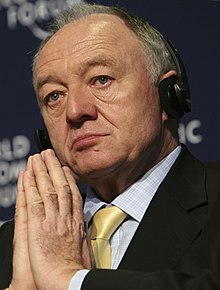
Back كين ليفنغجستون Arabic كين ليفنججستون ARZ Ken Livingstone BAR Кен Ливингстън Bulgarian Ken Livingstone Czech Ken Livingstone Welsh Ken Livingstone Danish Ken Livingstone German Ken Livingstone Esperanto Ken Livingstone Spanish
Ken Livingstone | |
|---|---|
 Livingstone at the World Economic Forum in 2008 | |
| Mayor of London | |
| In office 4 May 2000 – 3 May 2008 | |
| Deputy | Nicky Gavron Jenny Jones Nicky Gavron |
| Preceded by | Office established |
| Succeeded by | Boris Johnson |
| Leader of the Greater London Council | |
| In office 17 May 1981 – 31 March 1986 | |
| Deputy | Illtyd Harrington John McDonnell Michael Ward |
| Preceded by | Horace Cutler |
| Succeeded by | Office abolished |
| Member of Parliament for Brent East | |
| In office 11 June 1987 – 14 May 2001 | |
| Preceded by | Reg Freeson |
| Succeeded by | Paul Daisley |
| Councillor for the Greater London Council | |
| In office 12 April 1973 – 31 March 1986 | |
| Divisions | Norwood (1973–1977) Hackney North and Stoke Newington (1977–1981) Paddington (1981–1986) |
| Succeeded by | Position abolished |
| Personal details | |
| Born | Kenneth Robert Livingstone 17 June 1945 Lambeth, London, England |
| Political party |
|
| Spouses | |
| Children | 5 |
| Education | Philippa Fawcett Teacher Training College |
Kenneth Robert Livingstone (born 17 June 1945) is an English retired[2] politician who served as the Leader of the Greater London Council (GLC) from 1981 until the council was abolished in 1986, and as Mayor of London from the creation of the office in 2000 until 2008. He also served as the Member of Parliament (MP) for Brent East from 1987 to 2001. A former member of the Labour Party, he was on the party's hard left, ideologically identifying as a socialist.
Born in Lambeth, South London, to a working-class family, Livingstone joined Labour in 1968 and was elected to represent Norwood at the GLC in 1973, Hackney North and Stoke Newington in 1977, and Paddington in 1981. That year, Labour representatives on the GLC elected him as the council's leader. Attempting to reduce London Underground fares, his plans were challenged in court and declared unlawful; more successful were his schemes to benefit women and several minority groups, despite stiff opposition. The mainstream press gave him the moniker "Red Ken" in reference to his socialist beliefs and criticised him for supporting republicanism, LGBT rights, and a United Ireland. Livingstone was a vocal opponent of the Conservative Party government of Prime Minister Margaret Thatcher, which in 1986 abolished the GLC. Elected as MP for Brent East in 1987, he became closely associated with anti-racist campaigns. He attempted to stand for the position of Labour Party leader following Neil Kinnock's resignation in 1992, but failed to get enough nominations. Livingstone became a vocal critic of Tony Blair's New Labour project that pushed the party closer to the political centre and won the 1997 general election.
After failing to become Labour's candidate in the 2000 London mayoral election, Livingstone successfully contested the election as an independent candidate. In his first term as Mayor of London, he introduced the congestion charge, Oyster card, and articulated buses, and unsuccessfully opposed the privatisation of London Underground. Despite his opposition to Blair's government on issues like the Iraq War, Livingstone was invited to stand for re-election as Labour's candidate. Re-elected in 2004, he expanded his transport policies, introduced new environmental regulations, and enacted civil rights reforms. Overseeing London's winning bid to host the 2012 Summer Olympics and ushering in a major redevelopment of the city's East End, his leadership after the 7 July 2005 London bombings was widely praised. After losing both the 2008 and 2012 London mayoral elections to the Conservative candidate Boris Johnson, Livingstone became a key ally of Labour leader Jeremy Corbyn in 2015. A longstanding critic of Israeli policy regarding Palestinians, his comments about the relationship between Adolf Hitler and Zionism resulted in his 2016 suspension from Labour, after which he resigned from the party in 2018.
Characterised by Charles Moore as "the only truly successful left-wing British politician of modern times",[3] Livingstone was a controversial and polarising figure. Supporters praised his efforts to improve rights for women, LGBT people, and ethnic minorities in London, but critics emphasised allegations of cronyism and antisemitism, and criticised him for his connections to Islamists, and Irish republicans.
- ^ BBC News 2009.
- ^ Badshah, Nadeem (19 September 2023). "Former mayor of London Ken Livingstone diagnosed with Alzheimer's disease". The Guardian. Retrieved 19 September 2023.
- ^ Moore 2007; Purnell 2011, p. 314; Eaton 2014.
© MMXXIII Rich X Search. We shall prevail. All rights reserved. Rich X Search